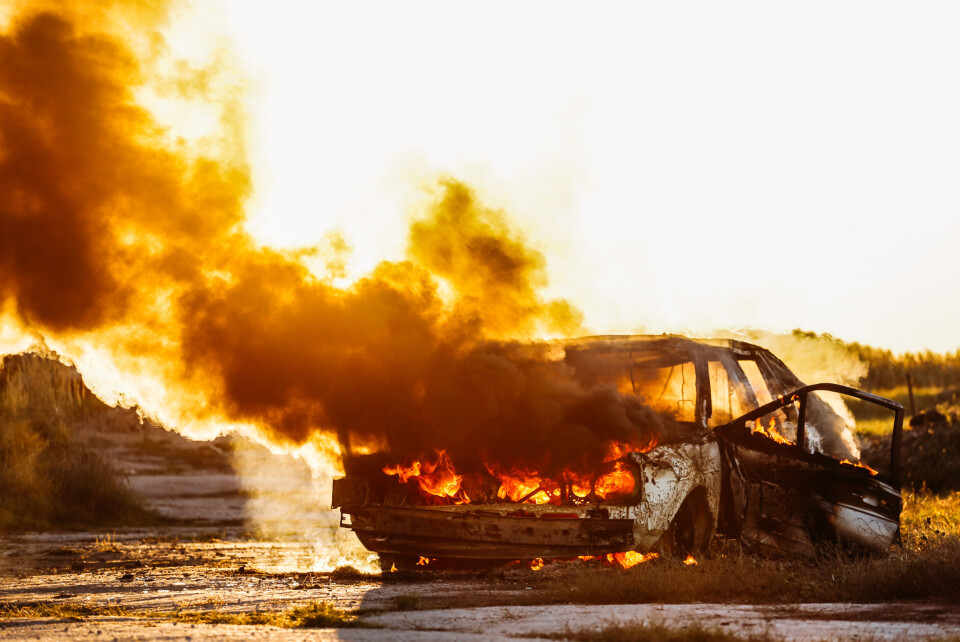-
La Voie Bleue: European Cycle Route of the Year is in France
700km bike path linking Luxembourg and Lyon has been crowned winner of the 2026 title
-
Before and after: Garonne river floods in south-west France
Satellite images show extent of flooding from back-to-back storms in February
-
Home insurance increases expected in France after floods
Compensation costs for the recent storms and flooding across the west and south-west is estimated to be in the billions of euros
‘Feuds’ ‘claim scams’ ‘rebels’: Why French cars get burnt at New Year
This year 874 cars were set alight. The annual ‘event’ started in 1988 near Strasbourg

Burning cars is a regular occurrence across France - this year 82 cars have been set alight in the Rhone-Alpes, 186 in Ile-de-France, 36 in Yvelines, 87 in Strasbourg and its nearby regions on New Year’s Eve alone.
In total this New Year 874 cars were burnt resulting in 441 people being questioned and 381 placed into custody Gerald Darmanin France’s Minister of the Interior stated in a press release on January 1.
Mr Darmanin noted a decrease in numbers when compared to 2019 - the latest comparative figures due to a partial curfew in 2020 - which saw 1,316 cars burned although fewer people were questioned or placed into custody.
Journalists, experts, politicians and members of former and current governments regularly opine on why these acts of vandalism happen.
First case was near Strasbourg in 1988
The first case was reported in 1988 in La Meinau, a suburb near Strasbourg the easternmost city of France, according to Jérôme Fourquet, a member of the French political centre-left think-tank Fondation Jean-Jaures, who has published a study on the subject.
The foundation’s data shows that from 379 cars burned in 2003 the figures have increased each year to 2019’s high. The figure did reduce in 2020 to 861 cars, mainly explained by the partial Covid-related confinement in place at that time.
“The blazes are in part rooted in personal feuds and the settling of scores and also some are thought to be related to insurance fraud.
“More broadly, the burned-cars phenomenon reflects the urban violence issue [in France] and acts almost as a signature-styled event alongside rivalry between youngsters and police forces,” Mr Fourquet said.
‘It’s like an annual bonfire expressing a rebellion’
Jean-Pierre Grandin, a 62-year-old retired professor, who published a study on the topic in partnership with his daughter in 2013 agrees:
“It is like the annual bonfire expresses a rebellion,” he told The Connexion, saying it is rooted in the economic disarray experienced by young people from the suburbs who feel rejected after the “30 Glorieuses” - the 30-year-post-World War Two period of economic prosperity.
“[They sense] a wall [between them and the rest of society] has been built and feel like apatrides (stateless and displaced)”.
To some conservatives and far-right politicians the New Year’s Eve car blazes are symbolic of France’s contestation of authority, the issue of immigrant integration and the controversial notion of “zone de non-droit”. These so called ‘no-rights zones’ are areas where the police no longer enforce order because of the retaliation they face in doing so.
This is contrary to the views of French sociologist Michel Wieviorka who believes politics is not the principal motivation behind the fires.
In an interview for the 20 Minutes newspaper Mr Wieviorka said “This is first and foremost playful [or fun]. It is technically very easy to set a car on fire then run away. Furthermore, it is not risky from a police standpoint for youngsters.
“And it is not as if you have to go very far to do it - it can be done in your own neighborhood,” he added.
Whatever its causes there is no current sign of this tradition ending.
























